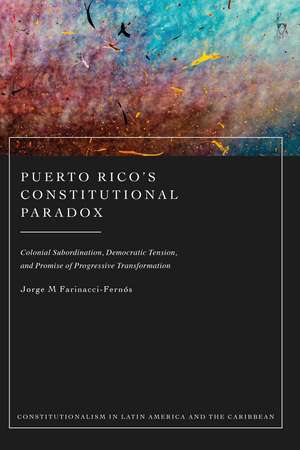Puerto Rico’s Constitutional Paradox: Colonial Subordination, Democratic Tension, and Promise of Progressive Transformation: Constitutionalism in Latin America and the Caribbean
Autor Jorge M Farinacci-Fernósen Limba Engleză Paperback – 21 aug 2024
| Toate formatele și edițiile | Preț | Express |
|---|---|---|
| Paperback (1) | 303.80 lei 3-5 săpt. | |
| Bloomsbury Publishing – 21 aug 2024 | 303.80 lei 3-5 săpt. | |
| Hardback (1) | 509.93 lei 6-8 săpt. | |
| Bloomsbury Publishing – 22 feb 2023 | 509.93 lei 6-8 săpt. |
Preț: 303.80 lei
Nou
Puncte Express: 456
Preț estimativ în valută:
58.14€ • 63.13$ • 48.84£
58.14€ • 63.13$ • 48.84£
Carte disponibilă
Livrare economică 02-16 aprilie
Preluare comenzi: 021 569.72.76
Specificații
ISBN-13: 9781509953509
ISBN-10: 1509953507
Pagini: 240
Dimensiuni: 156 x 234 x 25 mm
Greutate: 0.3 kg
Editura: Bloomsbury Publishing
Colecția Hart Publishing
Seria Constitutionalism in Latin America and the Caribbean
Locul publicării:London, United Kingdom
ISBN-10: 1509953507
Pagini: 240
Dimensiuni: 156 x 234 x 25 mm
Greutate: 0.3 kg
Editura: Bloomsbury Publishing
Colecția Hart Publishing
Seria Constitutionalism in Latin America and the Caribbean
Locul publicării:London, United Kingdom
Caracteristici
Considers the specific individual components that make up Puerto Rico's constitutional structure, including history, adoption process, and substantive content
Notă biografică
Jorge M Farinacci-Fernós is Associate Professor at the School of Law, Inter American University of Puerto Rico.
Cuprins
1. Concepts and Structure I. Overview II. Constitutional Components III. Conceptual Factors IV. Integrated Analytical Structure 2. Puerto Rico before 1952 I. A History of Subordination and Authoritarian Antecedents: Spanish Colonialism and Early US Domination II. Puerto Rico's Territorial Status Prior to 1952 III. The Unfulfilled Potential of Puerto Rico's Quest for Social Justice 3. The Constitutional Creation Process I. In the Shadow of Colonialism II. Democratic Mechanisms and Majoritarian Preferences III. An Exercise in, Sometimes, Radical Politics 4. The 1952 Constitution (Structure) I. A Colonial ConstitutionII. The Direct Impact of Colonialism on the Political Structure and Amendment Mechanisms III. Democratic Deficits: The Political Structure of the 1952 Constitution IV. Amendment: Substantive and Procedural Limitations 5. The 1952 Constitution (Substance) I. A Substantive, Progressive, and Social Constitution II. Human Dignity, Equality, and Discrimination III. Other Political Rights IV. Criminal Procedure GuaranteesV. Socioeconomic Rights VI. Section 19 VII. Other Substantive Policy Provisions VIII. Congressional Anti-socialist Veto and Puerto Rican Colonial Acceptance 6. Puerto Rico under the 1952 Constitution I. Introduction II. A History of Judicial Underenforcement and Nominal Lip Service III. The Illusion of Decolonisation, Autonomy, and Sort-of Equal Treatment IV. Democratic Crisis: The New Two-party System, Political Repression, and Armed Struggle 7. Recent Developments Regarding the Puerto Rican Constitutional Project I. Colonialism in the Twenty-first Century II. The 1952 Constitution's Internal Democratic Blind Spots Finally Emerge III. The Constitution, Class Struggle, and Police Power During the Pandemic IV. Final Thoughts


